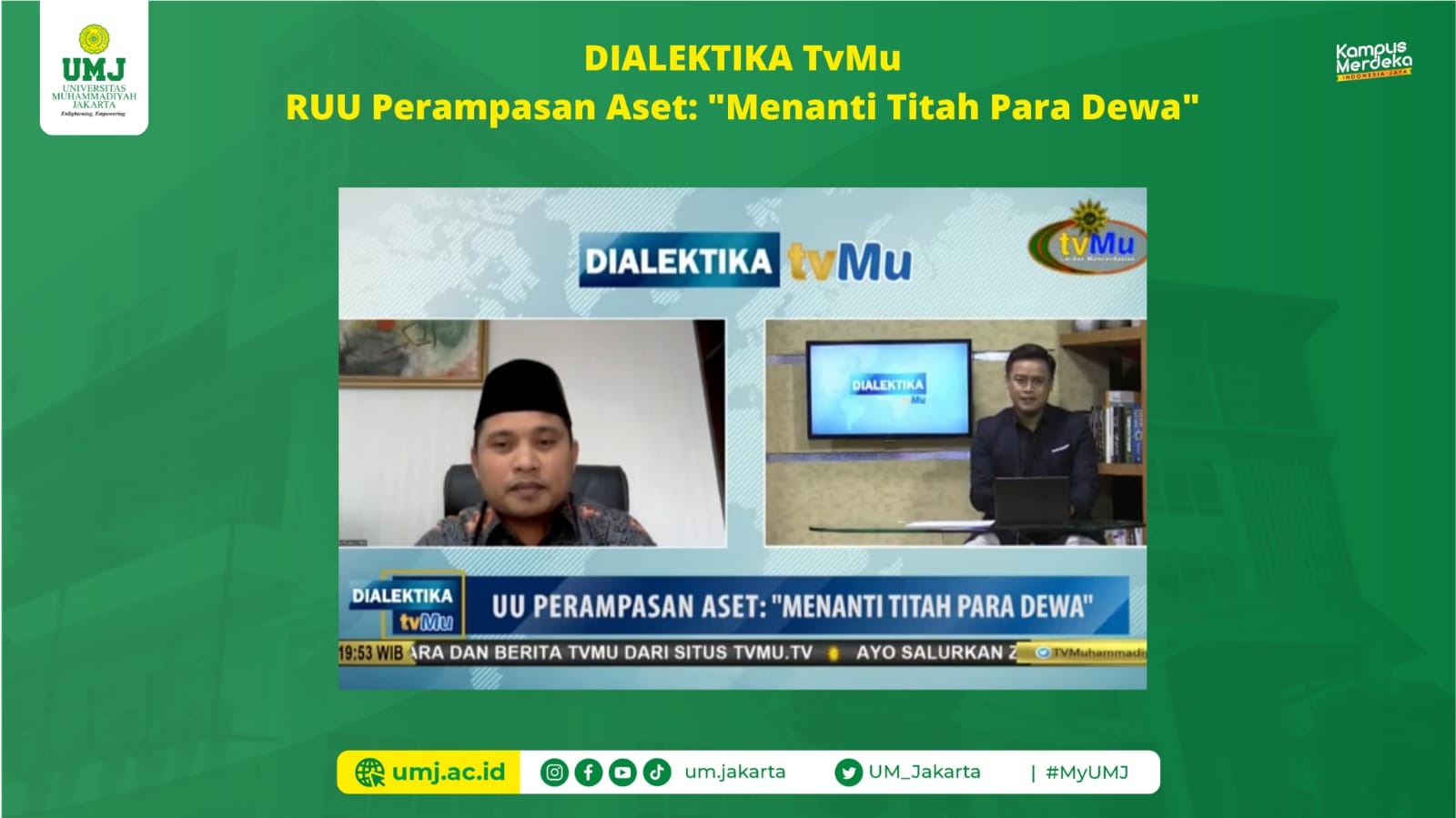The government as the initiator in passing the Asset Confiscation Bill (RUU) should be supported by the DPR because the bill provides legal certainty and a legal basis for an effective and efficient mechanism for confiscating the assets of criminals. This statement was conveyed by Deputy Chancellor IV of the Muhammadiyah University of Jakarta (UMJ) Dr. Septa Chandra, S.H., M.H. , while being an online resource person in the DIALEKTIKA program entitled Asset Confiscation Bill: “Waiting for the Commandments of the Gods”, Sunday (09/04/2023).
“The Asset Confiscation Bill regulates an asset confiscation mechanism that does not need to wait for the normal legal process from investigations, investigations, to an incredulous judge’s decision. Confiscation of assets that cannot be proven, such as in the case of Rafael Alun, can be confiscated without going through a court mechanism. Furthermore, in this bill there is proof in reverse in its entirety, which means that it must prove where all the perpetrator’s property came from. If you can’t prove its origin, then the treasure can be considered the result of a crime,” explained Septa.
Septa also stated that the factor hindering the process of the Asset Confiscation Bill becoming a Law was the presence of political will.According to him, the words of the Chairman of Commission III of the DPR RI Bambang Wuryanto to the Coordinating Minister for Political, Legal and Security Affairs Mahfud MD regarding the proposed ratification of the bill at a hearing with Commission III DPR RI at the Parliament Building, Senayan, Jakarta, Wednesday (29/3/2023), regarding interested parties To pass the Asset Confiscation Bill, you must first lobby the superiors of the legislature members, namely the general chairman of a political party, which is a bad practice in state administration. Such political interests can create a negative stigma in society.
“I hope that the Asset Confiscation Bill can be passed into law soon, because this bill is a necessity if you are serious about taking care of the country and recovering assets resulting from crime by perpetrators. Without this bill, law enforcement against criminal acts related to state assets and property at home and abroad will not be maximized. In addition, it is hoped that it can raise awareness for the perpetrators to report the results of their crimes without going through the Public Prosecutor in proving what the initial crime was like, like the Money Laundering Crime of TPPU),” said Septa who also serves as the Expert Council on the Law and Human Rights Council of the PP Muhammadiyah .
On the same occasion, Senior Economist M. Fadhil Hasan, Ph.D. discusses the reality of the Asset Confiscation Bill and the eradication of corruption, including efforts to develop the economy in Indonesia. He stated that what was happening in the DPR was a matter of concern because the DPR currently did not follow the aspirations of the people, but was determined or directed by the legislative process by political parties, especially by the chairman in general.
“In the next election, we must identify which members of the DPR from political parties do not discuss or are not pro towards the ratification of the Asset Confiscation Bill. We punish them by not being re-elected, because following the orders of the Chairperson of a political party is not the aspirations of the people,” Fadhil appealed. Furthermore, according to him, the state must realize that future economic development is largely determined by the extent to which the state can eliminate corrupt practices that have an impact on the economy, so that later the benefits can be obtained by the community and the state does not need to owe debts to other countries.
Usman Hamid, SH., M.Phil., Head of Public Policy Studies and Advocacy for Public Policy Advocacy at LHKP PP, SH., M.Phil., made suggestions to the government and the DPR regarding the polemic on eradicating corruption with the Asset Confiscation Bill. He said that he had to start improving performance in maintaining the country’s economy, including by ensuring that nationally there was asset recovery and asset confiscation. Then, globally make efforts to get the repatriation of state-owned assets abroad because of the proceeds of corruption.
Usman said that in the concept of eradicating money laundering crimes and also confiscating assets, what is desired is not only for the perpetrators to be punished but for these assets to be returned and recovered. “These are not just corruption assets, but state assets controlled by corporations or private companies to manage for business purposes, even though their main goals are oriented to public or community services, which are useful for the benefit of the people’s and state’s economy, so they are not private,” said Usman.
According to him, the Asset Confiscation Bill is the answer to legal problems that are currently occurring, including the gaps in the problems in the TPPU Law which have not succeeded in recovering assets hidden by criminals, both tax evasion and transferring assets to other countries. Usman added, that could also ensure that the management of funds by the government is more open and data management can be better, including transparency from state-owned industries, clearing the bureaucracy, improving the quality of political parties, to ensure that the government and DPR create a legal state based on Pancasila. (QF/KSU)
Editor : Tria Patrianti

